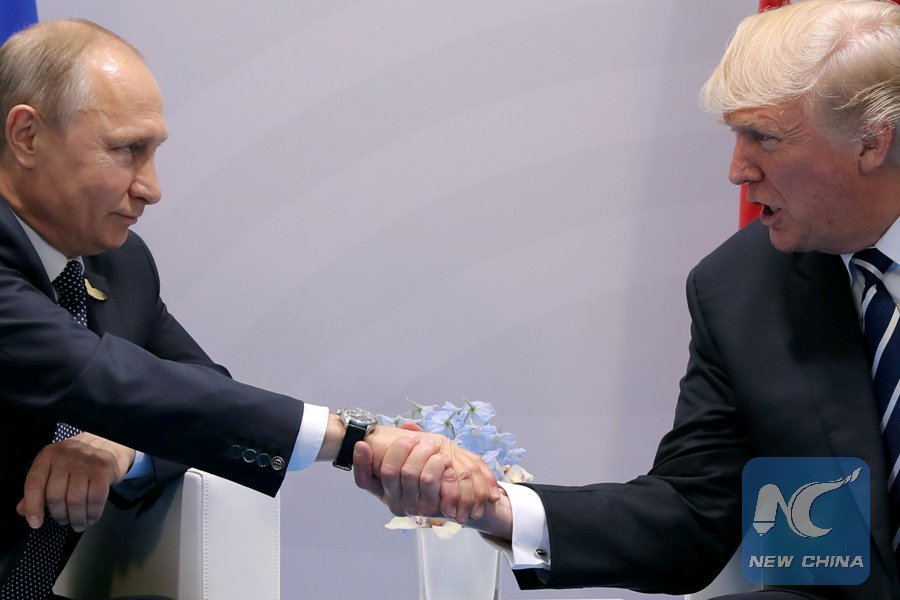
U.S. President Donald Trump shakes hands with Russian President Vladimir Putin during the their bilateral meeting at the G20 summit in Hamburg, Germany July 7, 2017. (Xinhua/REUTERS)
WASHINGTON, July 27 (Xinhua) -- The U.S. Senate on Thursday overwhelmingly approved a bill that will slap tougher sanctions on Russia, Iran and the Democratic People's Republic of Korea (DPRK), two days after the bill was approved by the U.S. House of Representatives.
The bill, approved by a vote of 98 to 2, will also grant the U.S. Congress the power to block U.S. President Donald Trump from unilaterally lifting sanctions on Russia. The bill will now be sent to the White House for Trump to sign into law or veto.
Bernie Sanders, who voted against the bill, said on Twitter that "following Trump's comments that he won't recertify Iran's compliance with the nuclear agreement I worry new sanctions could endanger it." Republican Senator Rand Paul also voted against the bill.
Senate Minority Leader Chuck Schumer said via Twitter that by passing the bill decisively, the Senate demonstrated its unity against Russia and sent a direct message to the country's government not to interfere in U.S. elections.
This bill came although Trump administration officials had called on lawmakers to grant "flexibility" to the White House in dealing with Russia.
So far, it remained unclear whether Trump will veto the bill or sign it into law.
Experts expect Trump to sign the bill, probably with reluctance.
"The White House will not like the bill, as it limits presidential authority," Steven Pifer, a senior fellow at Brookings Institution, told Xinhua.
But Trump "may have no choice but to sign," Pifer said.
Speaking on Thursday before the vote in Senate, White House spokesperson Sarah Huckabee Sanders said that while the Trump administration "supports sanctions" against Russia, Iran and the DPRK, the White House would make a decision after seeing the contents of the final bill.
Newly appointed White House communications director Anthony Scaramucci told U.S. media that Trump "may sign the sanctions exactly the way they are, or he may veto the sanctions and negotiate an even tougher deal against the Russians."
On Tuesday, the U.S. House of Representatives overwhelmingly passed the bill aimed at targeting key Russian officials in retaliation for Moscow's alleged interference in the 2016 U.S. presidential election, as well as sanctions against Iran and the DPRK in response to their weapons programs.
On Wednesday, the Kremlin said Russia will respond to a new round of sanctions by the United States should they become law.
"The attitude to this will be formulated after careful analysis, and the decision will certainly be taken by the head of state, President Vladimir Putin," Kremlin spokesman Dmitry Peskov was quoted as saying by TASS news agency.
Peskov said the decision of U.S. lawmakers was "very sad news" for Russia-U.S. relations, international law and international trade relations.
The bill would impose sweeping sanctions on Russia, targeting its defense, intelligence, mining, shipping, energy and railway industries, and restrict dealings with its banks.
Reportedly it punishes Russia for its alleged role in Ukraine's crisis and the U.S. presidential election, the claims that Moscow has repeatedly denied.
Iran, too, vowed "a necessary response" to the new U.S. sanctions, according to the official IRNA news agency.
Iran is used to these kinds of "hostilities" and knows how to deal with them, Iranian President Hassan Rouhani said at a cabinet meeting.
"Iranians well know that they should resist and stand against their enemies," he said. "Over the past 40 years, the Iranians have faced numerous pressures, sanctions and accusations by the U.S. politicians and their propaganda machine."
"The Americans cannot tolerate an independent and influential country in this sensitive region," he said.

